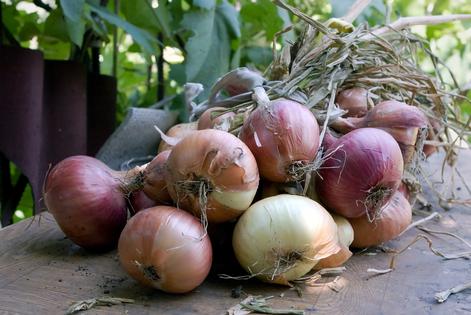Environmental Nutrition: Onions are worth the cry!
Published in Health & Fitness
No pantry is complete without onions.
The Folklore
Eaten and cultivated since prehistoric times, onions are integral to most every cuisine in the world. In addition to its tear-jerking effect on the eyes and pungency to the palate, onions have a many layered history. The Egyptians, Romans, and Greeks believed eating these strong-tasting orbs increased strength and courage. Onions deliver big flavor in a nutrient-dense package that is worth a few tears of joy.
The facts
Depending on variety, onions (Allium cepa) range in color, size, and flavor. Yellow, white or red bulb onions are classified as spring/summer or fall/winter (also known as storage onions). Spring/summer onions, which include Vidalia, Walla Walla, and Maui Sweet Onion, are mild or sweet tasting, while storage onions, such as Spanish onions, are strongly flavored and are often known by color, like yellow, white, or red. Green onions, or scallions, are immature bulb onions harvested before the bulb forms. One medium onion (about 1 cup) packs 20% DV (DV=Daily Value, based on 2,000 calories/day) of vitamin C, 11% DV of dietary fiber, and powerful plant chemicals, like quercetin, an antioxidant that promotes healthy respiratory and heart health.
The findings
Allium vegetables, particularly onions and garlic, have been shown to reduce the risk of several cancers. The sulfur-containing compounds in these vegetables may help combat each stage of cancer, especially cancers of the gastrointestinal tract, lung, and prostate (Nutrition and Cancer, 2020). A 2022 analysis of 17 studies concludes the potential protective role of alliums in the development of breast cancer as well (Iranian Journal of Public Health). In addition, onion has the highest amount of quercetin, which has been shown to play a crucial role against age-related diseases (Molecules, 2022).
The finer points
Select bulb onions that are firm, free of cuts or bruises, and have little or no scent. Keep in a cool, dark, dry place, with ventilation — storing them in plastic reduces shelf life. Refrigerate peeled or cut onions in a sealed container up to seven days. The onion performs as both spice and vegetable. Raw or cooked, chopped, sliced or diced, onion peps up any dish from guacamole to veggie sautes and whole grain sides. Onions are also a delight on the grill, roasted in the oven, marinated, or caramelized into sweet bliss.
(Reprinted with permission from Environmental Nutrition, a monthly publication of Belvoir Media Group, LLC. 800-829-5384. www.EnvironmentalNutrition.com.)
©2023 Belvoir Media Group. Distributed by Tribune Content Agency, LLC.










Comments